

14 essential customer service skills that drive business growth
A truly great company puts its customers at the centre of its operations, and prioritises hiring and developing skilled customer service agents.
Customer service is crucial to driving business growth through its role in retaining loyal customers. Companies leading in customer experience showed compound average revenue growth of 17% over a period of five years, compared to other companies who saw only 3% growth.
Customer service roles are also gaining more status and have excellent career prospects. This is partly due to the fact that services are becoming more complex, technical, and customers are expecting more. With many competing products, exemplary customer service makes your business stand out. This also means customer service should be part of everyone’s role.
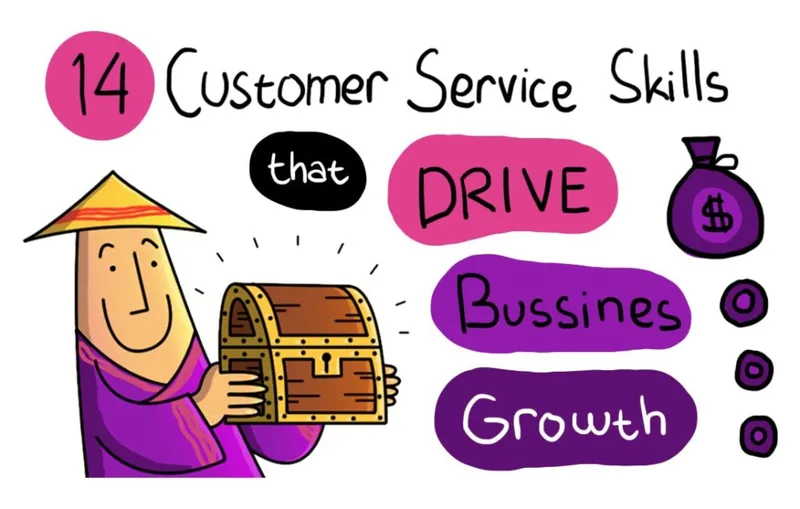
We want to really drill down into the core customer service skills that everyone in your company should be developing.
1. Empathy
Empathy is one of the most well-known customer service skills out there – but do you know what having empathy really means?
“Empathy is about finding echoes of another person in yourself,” says Mohsin Hamid. It’s a beautiful quote, but scientifically speaking there are two types of empathy you need to cultivate in customer service. These are affective empathy and cognitive empathy.
Cognitive empathy is being able to imagine what your customers are thinking and see things from their perspective. This skill is crucial to handling difficult problems and successfully helping customers. Affective empathy is feeling the emotions of others, and you need both to truly connect with people.
It’s possible to increase your natural empathy levels with regular practice. For example, the next time you encounter another human being, focus on what you have in common. We all desire food, shelter, warmth, love, appreciation, recognition and happiness. Reflect on these similarities, and allow them to override the differences.
2. Emotional control
While it’s important to have empathy and be in tune with your emotions, you also need to be able to control those emotions effectively.
Emotional intelligence is a psychological theory created by Peter Salovey and John Mayer, and it was popularised by Daniel Goleman. Shorthand for emotional intelligence is EQ. Emotional control is a subset of EQ, and in plays an important role in successful social interactions.
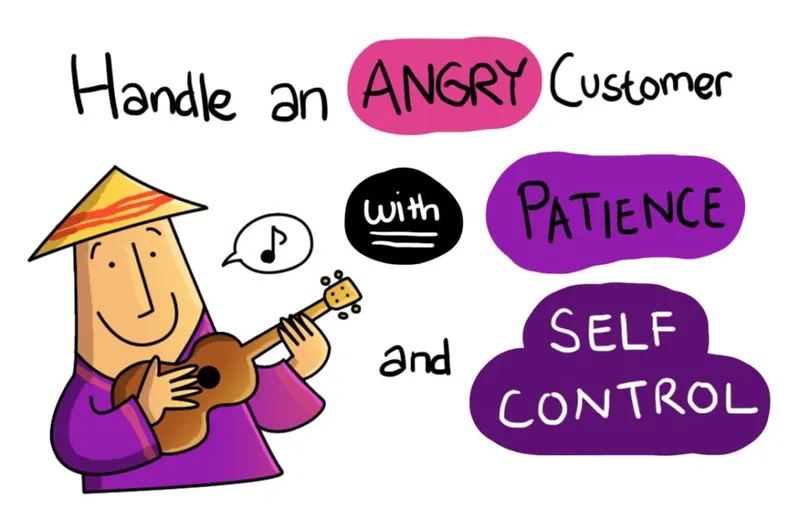
Emotional control is when a person manages the generation, experience, or expression of their emotions, and also their own emotional responses to the emotions of others. It means we don’t lose control when we feel frustrated and start shouting abuse at customers.
We can choose how and when we express our emotions, giving us the ability to guide a social interaction towards a desired outcome. That doesn’t mean you should take abuse from customers, but you should be in control of adapting your response to any given situation.
You need to become more self-aware so you can control your emotions, instead of just denying or repressing them. Practicing mindfulness will help you become more aware of your emotions moment-to-moment.
Next time you have a spare ten minutes, set a timer and meditate on your breath. This will help you become aware of your body’s sensations, including your emotions.
3. Projecting warmth
Projecting warmth is the ability to make customers feel like you care about them and put them at ease, and it’s strongly predictive of purchase intent. If your prospective customers are thinking about buying your products and they reach out to customer service, they should feel they get a warm response. But what does this actually mean?
Social psychologists call it the warmth and competency model and it goes beyond the idea of “smile more”. Our unconscious ability to pick up on the warmth and competence of others determines up to 82% of our overall judgments about that person.
Warmth is defined as showing trustworthiness, friendliness, helpfulness and sincerity. You can train your agents to show these traits by being accurate in your customer service, smiling and remembering your customers, going the extra mile to help your customers, and living up to your values.
You project warmth partly with your tone of voice, but also with body language and how you dress. Warmth is conveyed differently over digital channels compared to face-to-face or over the phone. If you’re communicating with text only through email or live chat, make sure your written communicationis warm and friendly using the odd exclamation mark, and even emoji.
4. Active listening
Listening to your customers is an important skill, and one that all customer service agents know well. But do you know how to apply the two distinct types of listening to your customer service?
“To learn through listening, practice it naively and actively. Naively means that you listen openly, ready to learn something, as opposed to listening defensively, ready to rebut. Listening actively means you acknowledge what you heard and act accordingly,” says Betsy Sanders, former Senior Vice President of Nordstrom.

Naive listening is the opposite of defensive listening, because you listen openly without focusing on your own intentions, while defensive listening is using the time when they speak to form a counter-response. Active listening means you feed back to the other person what you’ve heard them say to show you understand.
We’re all prone to cognitive bias, where we distort reality to fit our beliefs and ideas about the world. It’s our way of conserving attention, since we don’t need to pay attention to every little detail.
This evolutionary habit means we may end up missing important details about others. For example, we might assume a customer is struggling to understand the product, rather than seeing that there genuinely are technical problems with your software. This is huge, because unhappy customers are likely to churn, and then complain about you to 9–15 of their friends.
Practice naive listening by consciously emptying your mind the next time someone speaks to you. Wait until they have definitely finished speaking before you respond, and rephrase what you heard them say back to them to show that you understand.
5. Mirroring
We are all drawn to others who remind us of ourselves. Psychologically speaking, mirroring is the ability to match another person’s emotional state by reflecting their tone, body language, and words back at them. The use of mirroring in customer service is important in helping you to establish emotional rapport with your customer.
Mirroring helps people to feel an emotional connection with each other. Our ability to mirror is related to mirror neurons in the brain. Studies show the same parts of the brain fire when a person both performs an action themselves, as well as when they witness another person perform that same action. Mirror neurons enable us to vicariously experience what another person is feeling, and plays a central role in our ability to empathise.
Good use of mirroring in customer service will leave your customers with positive feelings about you, since they will feel seen and heard. On live chat or email for example, using some of the same words as your customers can contribute to effective mirroring. Be subtle about it so they don’t feel you’re mocking them.
6. Product knowledge
Customer service agents are the product experts. You are responsible for selling its use cases and benefits to existing customers.
Salespeople are often billed as the product experts, but nurturing repeat customers is crucial for SaaS businesses. In these types of businesses, the line between sales and customer service is blurry, and customer support agents often find themselves in the position of recommending services.
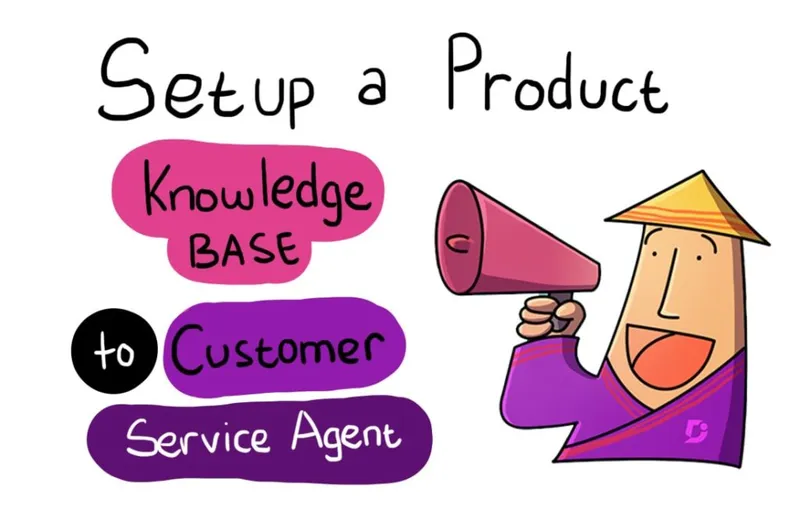
“Know what your customers want most and what your company does best. Focus on where those two meet,” says Kevin Stirtz, which is excellent advice for customer service agents.
You must be inclined to study your products and services with a level of attention to detail unknown to most people. Make it a goal to spend at least half an hour studying the product every day. Agree this with your manager so you can have dedicated time off from tackling frontline problems.
Develop your understanding of whatever product you’re supporting, research your own product and its competitors in depth, and be able to explain its potential for use in a variety of different situations. Being ready to recommend new features or plans will help you turn problems into an opportunity for impressing your customers.
7. Troubleshooting
If you’re working in customer service, you will be solving problems all day. You need to become very good at diagnosing a problem, choosing a course of action, and following it through to the end. Then rinse and repeat. These are your troubleshooting or problem-solving skills.
To make matters more difficult, you often have to tackle problems where you don’t have access to the customers’ product or service. Or, you are troubleshooting on behalf of someone else and may not have the full range of information. Sometimes customers will be angry at you right from the start.
Asking your customers the right questions and eliminating possibilities is key. You also need to think about the overall context of the problem, and whether it is unique to one customer or could be a system-wide problem.
Often the key to great troubleshooting is experience, and never give up – even when the situation feels impossible to resolve.
8. Situational Awareness
One skill that will help you get better at troubleshooting is the habit of Situational Awareness. This is a concept used in tactical combat, and it plays a key role in enabling individuals to make appropriate decisions in dangerous situations.
According to the National Academies of Sciences, Engineering and Medicine, “Situation awareness is the perception of the elements in the environment within a volume of time and space, the comprehension of their meaning, and the projection of their status in the near future.”
In a customer service role, it’s rare that you will find yourself in any real physical danger. But being able to read a situation quickly and decide what to do is crucial for keeping customers happy – and ensuring they don’t quit your business.
The goal is to increase your powers of observation of what is happening around you. Then you can more accurately predict a likely chain of events before it happens, and come across as incredibly prepared and proactive.
Ask yourself – what would I expect to see in this situation? Is the reality different to what I would normally expect to see? Practice thinking of possible scenarios and imagining what you would do to handle each situation, and then when the time comes you won’t be caught off-guard.
9. Patience
We all know that we need to have patience, but it’s not just about waiting passively for something to happen. It’s an active, mindful state we can all cultivate more in our lives. Patience is the ability to deliberately wait until the right moment to make your move – knowing that timing is often everything.
Unfortunately, many parts of being in a customer service role can be tedious and test our patience – especially if you’re hearing the same problems every single day. It’s tempting to rush through the job, and focus on targets instead of helping people.
Patience depends on remembering that every customer is unique and deserves your careful attention. “The two most powerful warriors are patience and time,” said Leo Tolstoy, the famous Russian author and intellectual.
Having patience means resisting the urge to rush towards a resolution, and instead accepting the natural flow of events as they happen. Exercising patience is how you create true customer satisfaction and loyalty.
Again, cultivating more mindfulness means you will be present to every situation – no matter how unpleasant or tedious. You’ll value each moment as a step in the journey. Next time you’re in the supermarket, actively seek a long queue to wait in, instead of picking the shortest line. Challenge yourself to wait peacefully.
10. Clear language
Customer service pros are masters at using clear language to get their point across.
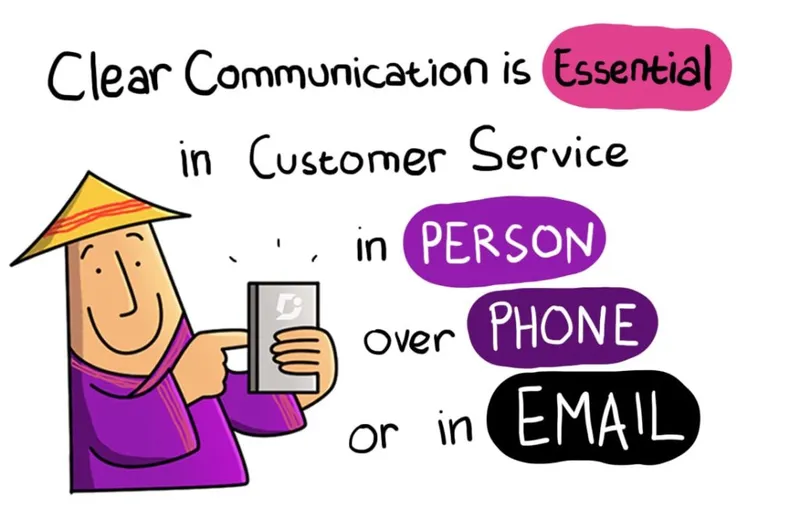
Your ability to clearly communicate your point is crucial, and this is especially true for email and chat where a lack of tone can create ambiguity. There must be no room for interpretation in your writing since there is very little feedback from the customer. If they can’t understand your questions or instructions then they won’t be able to fix their problems. Clear communication reduces customer effort and drives their loyalty.
There are no set rules for clear language since it all depends on your audience – each communication should be tailored for the individual. Your writing skills should be honed to the point where you can easily and clearly communicate your point so that someone else can understand it. This means being able to empathise with your customer and put yourself in their shoes.
When you write your next email, read it back to yourself to check that the meaning is clear. Edit it like you would a professional document, and restructure it so it flows better. Remove any words that are difficult to understand, and replace them with simpler words.
11. Sales abilities
Customer service agents increasingly need to develop their sales skills as well as their support skills. Your job is to retain customers, and these existing customers are actually more valuable to the business than new ones. You are 6 times more likely to sell to an existing customer than a new customer, for example.
This means customer support pros are partly responsible for sales, but it’s not about the hard sell. You may have products your customers don’t know about that you can recommend to them at the right time. This counts as selling, but comes across as helping.
Gain an intuitive sense for the time to recommend an upsell to your customer from your position of authority, and never, ever try to sell to an angry customer! If you’ve helped a customer with a query, and they seem happy, ask them if they would like to hear about a related product that could benefit them.
12. Organisational abilities
In a customer service role, you will get many queries that are complex, and that require considerable project management skills. No matter how difficult, you have to see every query through to completion. This often involves multiple steps and moving both forwards and backwards.
Sometimes, you’ll have to pick up a ticket from someone else (or multiple people) and be able to retrace what has happened. You have to be able to handle multiple and conflicting priorities with ease, and be able to see the bigger picture. You must have accurate perceptions of how long tasks will take, and be able to handle expectations.
On top of all this, you’ve got to stay cool under pressure. Missing something crucial could contribute to customer churn. Develop the ability to know when to follow up and effectively coordinate with other team members when something falls outside your remit.
Make the most of specialist software solutions like Help Scout, which have inbuilt functionality to help you project manage large volumes of tickets. If you don’t have access to this kind of software, set yourself reminders in your electronic calendar to follow up with particular customers.
13. Confidence
It may seem obvious, but customer service agents need build their confidence in order to be successful in their role.
Confidence is more about how you make other people feel, rather than how you feel inside. It involves outwardly projecting the fact that you believe in yourself, while at the same time being relaxed and humble so you don’t come across as arrogant.
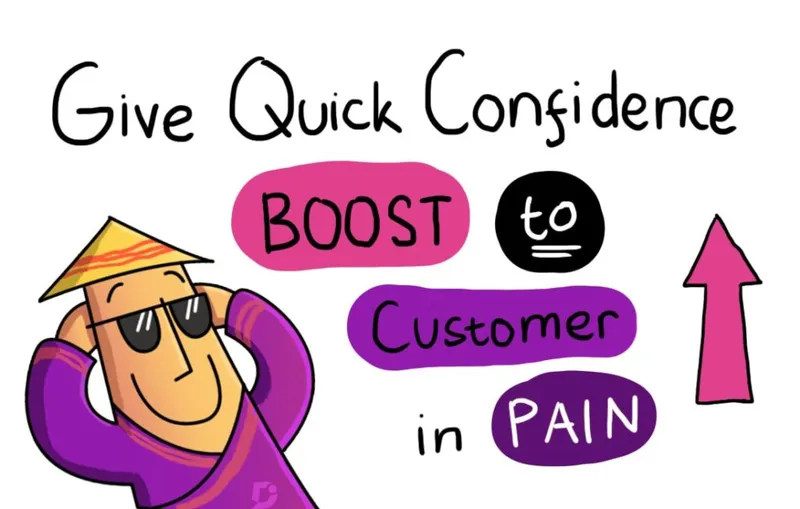
“At the time your customer is most insecure, is the time you need your front line most confident,” says Chip Bell, Keynote Speaker & Author, of The Chip Bell Group.
A confident employee puts customers at ease, and assures them that they can fix the problem – or at the very least find someone who will. Confidence is also infectious. It can come from experience, but you can also make the effort to learn to be more confident.
Try something new that lies just outside your comfort zone to give you a quick confidence boost. Talk to a person you might like to befriend, wear that daring outfit, or try a new sports activity. Make facing your fears a habit, to develop your confidence over time.
And when speaking to customers, make the effort to sound more authoritative (while at the same time respectful). Take control of the situation – don’t expect customers to tell you how to fix their own problems.
14. Emotional detachment
A customer service role naturally comes with a lot of stress, and dealing with unhappy customers can be emotionally draining. You must be able to handle high levels of stress without becoming overwhelmed or burning out – and that’s why emotional detachment is key.
“When you become detached mentally from yourself and concentrate on helping other people with their difficulties, you will be able to cope with your own more effectively. Somehow, the act of self-giving is a personal power-releasing factor,” says Norman Vincent Peale, author of The Power of Positive Thinking.
There are many things in customer service that you can’t control and detachment means keeping a healthy distance from the events that are happening. It doesn’t mean you don’t care about your job, since detaching healthily means you can see what is happening from a more objective perspective. You don’t take it as personally if a customer seems angry or upset, but you still care enough to fix problems.
Practice more detachment by accepting your emotional state as the only one you can be having right now. Try to become an objective observer of yourself, instead of getting caught up in a whirlwind of emotions.
Conclusion
Customer service is one of the most varied roles out there, with useful skills to develop ranging from more empathy and active listening, to organisational abilities and clear communication.
It’s a lifelong journey of learning, but you can start today to improve your skills in helping customers. “Customer service is an attitude – not a department,” says Mo Hardy. Good customer service means putting customers at the heart of everything you do as a company.
Customer service is everyone’s job – not only those working in the customer service department. We can all benefit from increasing these customer-focused skills, since customers are the lifeblood of every business.





